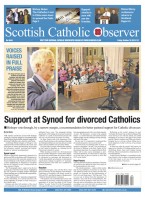BY Ian Dunn | October 30 2015 | ![]() 0 COMMENTS
0 COMMENTS ![]() print
print

Support at Synod for divorced Catholics
Publication Date: 2015-10-30
Bishops vote through, by a narrow margin, a recommendation for better pastoral support for Catholic divorcees
The family synod has closed with bishops voting by a narrow margin to recommend that Pope Francis backs better pastoral support for divorced Catholics on a case-by-case basis.
Archbishop Philip Tartaglia of Glasgow, who represented the Scottish Church at the synod, said it had been an ‘intense and absorbing’ process that had ultimately reached ‘profound and helpful’ insights on ‘pastoral accompaniment.’
Synod report
While not specifically mentioning a proposal of a path toward full reconciliation and Communion for the divorced and civilly remarried, members of the Synod of Bishops on the Family sent Pope Francis a report emphasising an obligation to recognise that not all Catholics in such a situation bear the same amount of blame.
The 94-paragraph report—approved on the last working day of the three-week synod—highlighted the role of pastors in helping couples understand Church teaching, grow in faith and take responsibility for sharing the Gospel.
It also emphasised how ‘pastoral accompaniment’ involves discerning, on a case-by-case basis, the moral culpability of people not fully living up to the Catholic ideal.
Bishops and other full members of the synod voted separately on each paragraph and the Vatican published those votes. The paragraph dealing specifically with leading divorced and remarried Catholics on a path of discernment passed with only one vote beyond the necessary two thirds.
As Pope Francis said at the beginning of the synod, Church doctrine on the meaning of marriage as a lifelong bond between one man and one woman open to having children was not up for debate.
The final report strongly affirmed that teaching as God’s plan for humanity, as a blessing for the Church and a benefit to society.
While insisting on God’s love for homosexual persons and the obligation to respect their dignity, the report also insisted same-sex unions could not be recognised as marriages and denounced as ‘totally unacceptable’ governments or international organisations making recognition of ‘marriage’’ between persons of the same sex a condition for financial assistance.
Reaction
Archbishop Tartaglia told the SCO it had been an honour to be delegate of the Bishops’ Conference of Scotland to the family synods in 2014 and 2015, said that the degree of disagreement in the Synod had been overstated.
“The purpose was to furnish Pope Francis with a document on the family, which had acquired the agreement of at least two-thirds of the Synod Fathers,” he said. “In fact 91 of the 94 paragraphs were agreed with massive majorities. The remaining three paragraphs passed with a two-thirds majority or more. The document—at least in the original Italian—is a well-written text, full of profound and helpful insights into the challenges facing marriage and family life today.”
He also said ‘it is important to understand that the synod document is not an end in itself.’
“Of itself it has no standing either in terms of doctrine or discipline,” he said. “It is an offering of the Synod of Bishops to the Holy Father for his discernment and action. It is expected that the Holy Father will in due course promulgate a post-
synodal Exhortation. It is there that we will begin to see the fruits of the two Synods of 2014 and 2015 on the family.”
Pope Francis
The Pope himself said the true defenders of doctrine are not those who uphold its letter, but its spirit in his closing address to the synod.
“The synod experience… made us better realise that the true defenders of doctrine are not those who uphold its letter, but its spirit; not ideas but people; not formulae but the gratuitousness of God’s love and forgiveness,” the Pope said. “This is in no way to detract from the importance of
formulae, laws and divine commandments, but rather to exalt the greatness of the true God, who does not treat us according to our merits or even according to our works but solely according to the boundless generosity of his Mercy.”
Reflecting on the synod’s purpose, he said: “Certainly, the Synod was not about settling all the issues having to do with the family, but rather attempting to see them in the light of the Gospel and the Church’s tradition and 2000-year history, bringing the joy of hope without falling into a facile repetition of what is obvious or has already been said.”
In interviews after the synod’s final report was approved on October 24, leading prelates such as Archbishop Bruno Forte and Cardinal George Pell had offered contradictory interpretations of recommendations.
As the Synod of Bishops is a consultative body, Pope Francis is free to adopt or disregard portions of the final report as he sees fit in any post-synodal documents or decisions.
—This story ran in full in the October 30 edition print of the SCO, available in parishes.











